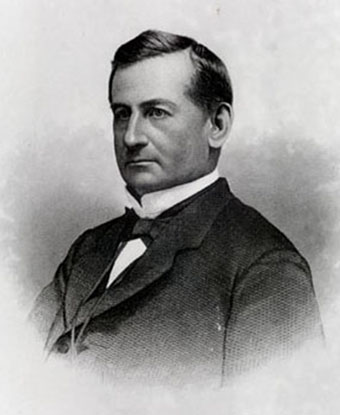Last updated: July 9, 2020
Person
Andrew G. Magrath

University of South Carolina
Andrew Gordon Magrath, a South Carolina jurist, famously resigned his seat as a federal judge in November 1860, following the election of Abraham Lincoln. Many considered this as the first overt step towards secession in South Carolina. Magrath sat in South Carolina's secession convention and later held minor roles in the Confederate States government. He was the last governor of South Carolina during the American Civil War under the Confederate States of America from December 20, 1864 to May 25, 1865.
Magrath was born in Charleston, South Carolina in February 1813, the son of an Irish merchant, John Magrath, and Maria Gordon. After his graduation from South Carolina College (now the University of South Carolina) in 1831, Magrath briefly attended Harvard Law School, but he acquired most of his legal training in Charleston from James L. Petigru, a respected jurist. Magrath was admitted to the bar in 1835. From 1838 to 1841, he represented the city parishes of St. Philip's and St. Michael's in the state House of Representatives. On March 8, 1843 he married Emma D. Mikell of Charleston. They had five children together. In 1865, Magrath married Mary Eliza McCord of Columbia, South Carolina.
In 1856, President Franklin Pierce nominated Magrath for a seat on the US District Court of South Carolina, which brought him national attention and controversy. His tenure coincided with increasing calls from some southern nationalists to reopen the African slave trade. Although personally opposed, Magrath handed proponents of the African slave trade a victory in 1860. In a decision associated with the cases surrounding the Echo and the Wanderer, ships sezied for illegally transporting African captives, Magrath stated that the 1820 federal statute on piracy did not apply to the slave trade. "The African slave trade is not piracy," he declared. In rejecting the piracy statute, proslavery and states' rights adovocates in the south praised Magrath.
Immediately following the election of Abraham Lincoln, Magrath resigned his judgeship on November 7, 1860. He told a crowded courtroom that "the department of Government, which I believe has best maintained its integrity and preserved its purity, has been suspended. So far as I am concerned, the Temple of Justice, raised under the Constitution of the United States, is now closed. If it shall be never again opened, I thank God that its doors have been closed before its altar has been desecrated with sacrifices to tyranny." Magrath then participated in South Carolina's Secession Convention and briefly served as the South Carolina secretary of state. In 1862, he was appointed as a Confederate district judge. His decisions generally opposed the centralization of power and President Jefferson Davis' administration.
In December 1864, Magrath was elected governor of South Carolina. During his time as governor, he continued his criticism of the Confederate government in Richmond, Virginia. Following the collapse of the Confederacy, Magrath was arrested in May 1865 and imprisoned at Fort Pulaski, Georgia. Released in December, Magrath returned to Charleston. He rebuilt his law practice and focused on his career as a lawyer until his death in 1893.
